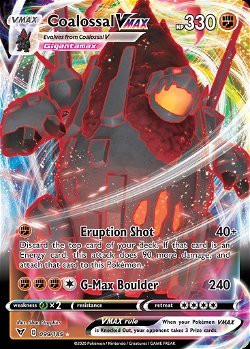Today, I decided to bring about Coalossal VMax from two different perspectives:
- A deck with a more defensive proposal (from the use of stadiums and tools) using recursive Pokémon like Magcargo and Oranguru to guarantee turn energies to cause constant damage and, with these energies, being able to diversify for special energies with offensive or defensive use;
- And the second deck, where the central focus will be on special energies at their maximum with turbo acceleration, that is, using Electrode GX to boost energy, and being able to use the benefits of damage reduction by 80 points and increase attack to 80.
Ad
About Coalossal VMax, the Colossal Fortress
Decklist
Coalossal VMax

Recursive Pokémon

- Diancie ◇ FLI 74 has Princess's Cheers: If this Pokémon is on the Bench, all of your Fighter Pokémon in play deal 20 more damage against your opponent's Active Pokémon (before applying weakness and resistance).
- Oranguru SSH 148 has Primate Wisdom, a kind of card exchange.
- Magcargo CES 24 has Smooth Over: you look for a specific card and shuffle your deck. That card you chose will be moved to the top of your deck, so you can draw it.
Deck operation
1) As soon as possible, you will assemble Coalossal V VIV 98 to be the attacking Pokémon and put it as active, and for safety, a second one also on the Bench. Then, you will bench, using the Nest Ball SUM 123, these Pokémon: Oranguru SSH 148, Slugma CES 23 and if possible, Diancie ◇ FLI 74.
And with that, it guarantees the ability of Diancie to gain 20 more damage against the active Pokémon, Oranguru by exchanging cards from the top of the deck with a card from your hand, and even Slugma to that, in the second turn, you can already evolve it into Magcargo.
2) Evolving Coalossal V VIV 98 to Coalossal VMAX VIV 99, you will use the following combo:
- Evolve Slugma CES 23 to Magcargo CES 24, but don't activate it yet.
- If you have Oranguru SSH 148 to use the ability to exchange cards from the top of the deck, perform the combo with Magcargo CES 24. If you have any fighting energy (whether special or basic), use Oranguru's ability so that this energy is on top of the deck. Otherwise, you use the Magcargo ability to search for that energy and leave it at the top.
3) Now is the time to use the Eruption Shot attack, which deals 40 plus 90 damage when discarding the top card of the deck that is an energy. After that, that power will be linked to Coalossal VMAX VIV 99.
Dealing these 130 damage, we have the variations that we can count on Diancie ◇ FLI 74 to increase another 20 damage, being able to give the sum of 150 damage and even the use of Strong Energy FFI 104 which deals an additional 20 damage, up to 170 damage for one energy!
4) For defensive maneuvers, we have the Lake Acuity LOR 160 stadium, which reduces incoming damage by 20 points. We also have the use of the tool Rock Chestplate sv1 192, which reduces 30 damage from opponent's attacks (after weakness and resistance).
In extreme cases, if you have the opportunity to use all four Stone Fighting Energy VIV 164, you can even gain a reduction advantage of up to 80 points (after applying the opponent's weakness and damage resistance), so, a total of 130 points of damage reduced!
5) If your Coalossal VMAX VIV 99 has basic fighting energies, don't think twice about using Max Potion GRI 128, as it helps to recover all damage, but in return, you discard all energies connected to it.
Ad
Preferably, choose Acerola BUS 112, as it recovers a Pokémon with any damage counter to your hand and all attached cards (including energy and tools), to always recycle the deck.
Trainer Cards

- Professor's Research (Professor Sada) sv1 189 serves as “draw power”: discard your hand and draw 7 cards.
- Acerola BUS 112 Heals a Pokémon that has any damage counters in play and puts it and all cards attached to it back into your hand.
- Boss's Orders BRS 132 serves to pull an opponent's benched Pokémon to close a specific knockout.
- Guzma BUS 115 serves to pull an opponent's benched Pokémon to become the active one, and then you switch one of your active Pokémon for one from the bench.

- Cyllene ASR 138 serves to recycle any cards you want from the discard, if you match the two coins that the card asks to be made at the cost of activation. If it works, it's an excellent option for recovery.
- Marnie SSH 169 serves to sabotage the opponent's hand and create a hand control: you and your opponent shuffle your hands and put these cards on the bottom of the deck - and then, you draw 5 cards and the opponent draws 4 cards.
- N FCO 105: you and your opponent shuffle your hands and draw the equivalent of prize cards you have in the game.
Assuming that your opponent has one prize card left to win the game, and you only drew four prize cards: playing N, you shuffle your hands, and in that, the opponent will draw only one card and you will draw 4 cards.
- Roxanne ASR 150 has a similar function to N FCO 105, only stronger and more potent, because it can only be activated from the moment the opponent has drawn 3 prize cards.
And since the deck has Coalossal VMax which provides 3 prize cards for the KO, the use of Roxanne is very critical against the opponent.

- Scramble Switch PLS 129 is classified as an ACE SPEC, that is, it can only have one in the deck. Its function is to transfer the active Pokémon to the Bench and if it does, those energies linked to the active are transferred to the new Pokémon promoted to the active position.
- VS Seeker PHF 109 has the role of a Supporter recycler, being able to pick up key cards for certain matches that match the need for the turn.
- Field Blower GRI 125 is an elimination of combinations of tool and stadium cards in play, which can be yours or the opponent's.
- Max Potion GRI 128 serves as a cure for the Pokémon that suffered the damage, however its downside is that all the energy attached to it is discarded.
- Heavy Ball NXD 88 serves as a search for Pokémon that have a Retreat Cost of at least 3 Colorless Energy in your deck, reveal it to your opponent, then you put it into your hand and shuffle the deck.
Ad
Used to search for Coalossal V VIV 98, Coalossal VMAX VIV 99 and Magcargo CES 24.
- Nest Ball SUM 123 is a Pokémon search, in this case, you search for a basic Pokémon from the deck and put it directly on the Bench, and then shuffle the deck.
This is to start setup with your recursive Pokémon, as I explained in the "step by step" topic.
- Float Stone BKT 137 gives free retreat to the Pokémon it's attached to. Excellent for Magcargo CES 24, Oranguru SSH 148 and/or Diancie ◇ FLI 74, as their retreat cost are two energies or more, and you must not lose them to keep your game plan.
- Rock Chestplate sv1 192 serves to reduce damage by 30 points (after applying weakness and resistance) to the Pokémon it is attached to. Essential for Coalossal.
Stadium

Lake Acuity LOR 160 is for both players who have Fighting and Water type Pokémon. Damage taken is reduced by 20 points (after applying weakness and resistance).
Special Energies

This energy serves as a damage boost for Fighting-type Pokémon by an additional 20 damage against the opponent's Active Pokémon (before applying Weakness and Resistance).

Stone Fighting Energy serves as a damage reduction for Fighting-type Pokémon by 20 damage against the opponent's Active Pokémon (after applying Weakness and Resistance).
Coalossal VMax - Special Energies Turbo Haste
Decklist
Coalossal VMax: the main attacker

Hisuian Arcanine V: secondary attacker

Hisuian Arcanine V does the same function that Weavile-GX UNM 132 formerly did for Dark Pokémon in the Sun/Moon era.
He can stack as many energies as you want to deal relatively high damage with Strong Energy FFI 104, in case some Coalossal VMax is in trouble and needs to win a turn.
It's useful to be able to deal damage quickly, and without losing 3 prize cards for free because of V Max.
Recursive Pokémon

- Diancie ◇ FLI 74 has Princess's Cheers: If this Pokémon is benched, all of your Fighting-type Pokémon in play deal 20 more damage on their attacks against your opponent's Active Pokémon (before applying weakness and resistance).
- Electrode-GX CES 155 has Extra Energy Bomb: If this Pokémon uses this Ability, it sacrifices itself so that you can attach up to 5 Energy from the discard pile to any of your Pokémon in the game that isn't the type EX or GX. But with the knockout of this Pokémon, the opponent will take two prize cards, since it is a Pokémon GX.
He is the deck's energy acceleration engine, because using his ability, he can attach these special energies to Coalossal VMax.
Deck operation
1) You will assemble Coalossal V VIV 98 as soon as possible to be the attacking Pokémon and set it as Active. Next, you'll quickly bench the Voltorb CES 47.
Ad
The ideal is to be the first to play on the first turn, as when it's your turn to play, on the other turn, you can try to evolve the Voltorb CES 47 to Electrode-GX CES 48 using the Pokémon Communication TEU 152 to exchange for Electrode-GX, which is the deck's main engine.
2) In these first two turns, try to discard all the special energies possible using Battle Compressor Team Flare Gear PHF 92, as each card of this one has the effect of discarding 3 cards from the deck. So with 8 special energies, you have a chance to have one Battle Compressor Team Flare Gear PHF 92 left with nine discards, that's in addition to considering the Quick Ball FST 237 to help, if there is a special energy in hand.
3) If you've done everything right, you activate the ability of Electrode-GX CES 48, Extra Energy Bomb, where it takes up to 5 energies from the discard pile for one of your Pokémon that aren't EX or GX (which is not our case, since our Pokémon is a VMax).
Thus, if the strategy is defensive, the use of energies will be Stone Fighting Energy VIV 164, which has a damage reduction of 20 points each energy (after application of weakness and resistance), and may have the total sum of 80 points reduced. And if you want to make your Coalossal VMAX VIV 99 more durable, there's the Buff Padding TEU 136 tool, which if the Pokémon that has it has exactly 4 retreat cost, it gains 50 more HP, going from 330 HP to 380!
If the strategy is more aggressive, you have the use of Strong Energy FFI 104 energies, which add 20 damage (pre-application of weakness and resistance), being able to add 80 damage, even more with the benefit of Diancie ◇ FLI 74, which does 20 more damage against the Active Pokémon.
That is, you gain an additional 100 damage bonus, taking your G-Max Boulder attack from 240 damage to 340 damage!
4) If you don't want to waste the special knockout energies of Coalossal VMAX VIV 99, you can play Hisuian Arcanine V SIT 90, promote it to make the replacement and be the new active and from there, use its ability to draw energy from your Pokémon to it, making it the new attacker and heal Coalossal VMax with Max Potion GRI 128.
And when you notice that it will be knocked out, you can use Scramble Switch PLS 129, after having healed Coalossal VMAX VIV 99 before with the cure done and return with his strategy with 330 HP or up to even 380 HP and still being able to hit 240 damage with a reduction of 80 damage or causing from 240 to 320 damage with special energies, reaching up to 340 at maximum power!
Trainer Cards
Since the lineup of Supporting Trainers and Items is the same as the list above, I'll focus on the small changes:

- Bird Keeper DAA 159 serves as a “switch” with “draw power”. You switch one of your Active Pokémon to one on the Bench, then draw 3 cards.
Ad
- Korrina FFI 95 searches for a Fighting-type Pokémon (F) and an Item card (in this case, Heavy Ball, for example, to search for Coalossal V or Coalossal VMax).
- Trainers' Mail ROS 92 is for looking at the top 4 cards of the deck and looking for any Trainer you find there (except Trainers' Mail) and putting it in your hand.
- Pokémon Communication TEU 152 is used to change a Pokémon from your hand to one from the deck, and this one that was in the deck will remain in your hand.
- Battle Compressor Team Flare Gear PHF 92 serves to discard 3 cards from your deck and obviously put them in the discard pile - what you must do with the special energies to make the combo with the Electrode-GX .
- Buff Padding TEU 136 can only be equipped on Pokémon that have a retreat cost of exactly 4 energies. If done right, it will gain 50 more HP, being ideal for Coalossal-V and Coalossal-VMax.
This energy serves as a function of "Double Colorless Energy", but it has the downside that you lose 20 points of damage on your attacks, if you have it equipped.
Special Energies

Serves as a damage boost for Fighting-type Pokémon by an additional 20 damage against the opponent's Active Pokémon (before applying Weakness and Resistance).

Serves as damage reduction for Fighting-type Pokémon by 20 damage against the opponent's Active Pokémon (after applying Weakness and Resistance).
Format archetypes
Advantages
- Advantage against electric decks.
- In the first deck, there is a good topdeck manipulation, and being able to constantly hit even with an energy until you reach the G-Max attack
In the second deck, it has a turbo way of progressing. From the second turn of the game, it starts attacking ferociously, not giving the opponent many reaction options.
- Durability for being a robust Pokémon with 330 HP, which is very welcome; and in the case of the second deck, it has the tool Buff Padding TEU 136 that grants another 50 HP, reaching around 380 HP.
Disadvantages
- Grass archetype decks.
- Decks that have Miltank ASR 126 that don't take damage from Pokémon V.
- Deck that uses Temple of Sinnoh ASR 155 to sabotage special energies.
- Deck that has Duraludon VMAX CRZ 104 as one of the main attackers.
- Deck that uses Beedrill CRE 3, for its Instant Kill attack for special energies.
- Deck with Avery CRE 130, which can sabotage your bench.
Conclusions
Today I brought two variations of Coalossal decks, showing a possibility with the use of common and special energies and another focused only on special energies in a “turbo” shell, which is more aggressive and dynamic. As an overlooked Pokémon, Coalossal has a lot of potential overlooked by the community.
And now it's up to you: what do you think of the deck?










— Kommentare0
Sei der erste der kommentiert